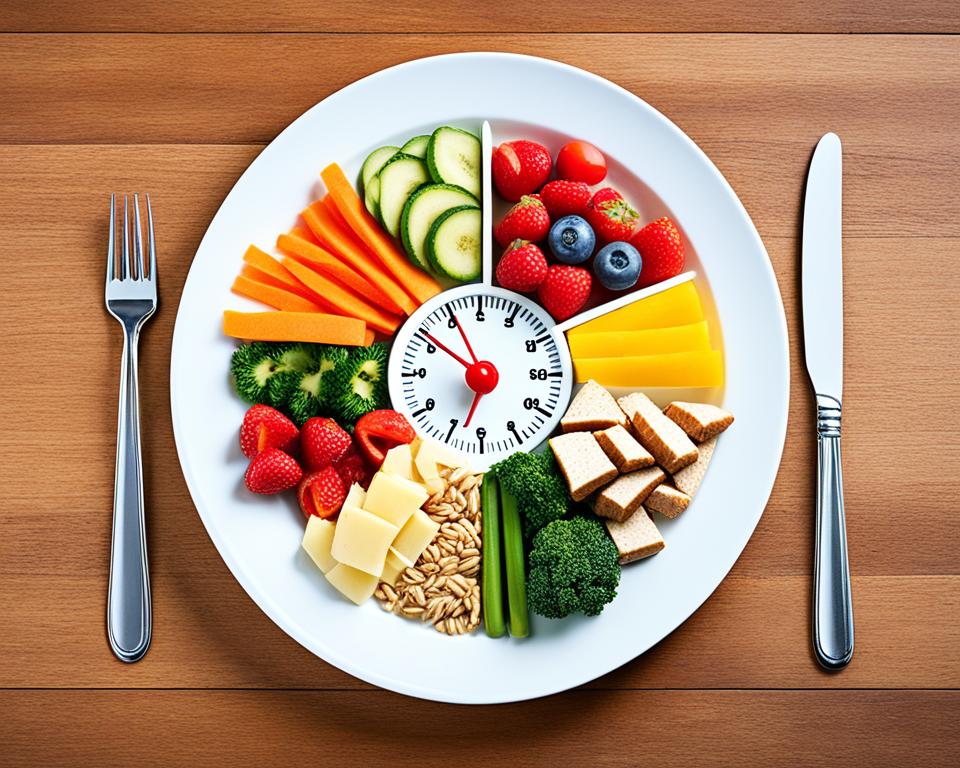
Eating Once A Day: Easy Weight Loss Strategy
Imagine losing up to 11 pounds in about 10 weeks. This is what 40 studies on intermittent fasting show. But looking closer, we see a story that’s more complex. Intermittent fasting has a wide range of dropout rates, from 0-65%. This rate is similar to traditional calorie restriction diets. It seems the timing and frequency of meals can make a diet easier or harder to stick with. This impacts how successful the diet is in the long run.
In a year-long study with 100 people, intermittent fasting was tested. It didn’t lead to better weight loss or metabolic benefits than regular calorie restriction. Yet, in another study over 12 months, those who ate in a set time frame lost a bit more weight than those who didn’t.
Still, intermittent fasting isn’t a good fit for everyone. It’s hard for people used to regular meals. It’s also risky for those with conditions needing consistent eating, like diabetes. For some people, like those with diabetes, eating disorders, or who are pregnant or teenagers, it’s not advised. The goal is to find a meal routine that fits your health needs and advice from doctors.
Key Takeaways
- Intermittent fasting can lead to a significant 7-11 pound weight loss in 10 weeks.
- The success rate of sticking with intermittent fasting varies, much like with traditional diets that restrict calories.
- Intermittent fasting might not be more effective than daily calorie counting for better health and body shape.
- Choosing when to eat, like in time-restricted eating, can affect weight loss, but results differ for each person.
- Before trying intermittent fasting, people with health concerns or special dietary needs should talk to a doctor.
Understanding the OMAD Diet: Basics and Benefits
I often explore fitness trends and “Eating Once A Day” has caught my attention. It’s known for its simple way to manage weight loss and calorie restriction. People choose it for its dietary freedom and potential health benefits from its special meal timing. Let’s dive into the OMAD diet to see what it’s all about and the benefits it offers.

Defining OMAD and Its Popularity
OMAD stands for Eating Once A Day. It means eating all your daily calories in one meal. There’s no snacking or small meals. Just one big meal a day. This simplicity has made OMAD very popular. It fits well into busy lives where preparing meals often feels like too much work.
Weight Loss and Calorie Restriction
If you want to lose weight, eating once a day can be appealing. With only one meal, it’s harder to eat too much, leading to calorie restriction. Most find it tough to eat a whole day’s calories at once. This helps in creating a calorie deficit for weight loss. However, being mindful of nutrition is key to avoiding health problems.
Nutritional Impact of One Meal A Day
Now, let’s talk about nutrition with OMAD. Is one meal enough to get all nutrients? It’s important to balance calories and make sure you’re getting enough vitamins and minerals. This means focusing on the nutritional value of your one meal is crucial. For example, calcium, which is essential, can be lower on OMAD.
To understand better, let’s compare calories burned in exercises to calories eaten on OMAD:
| Activity | Calories Burned Per Hour | OMAD Daily Caloric Intake |
|---|---|---|
| Running/Skipping | 861 – 1,074 | ~750 |
| Yoga | 228 | |
| Kayaking/Weightlifting/Light Swimming | 400 – 500 | |
| NHS Recommendation (Weekly Moderate Activity) | N/A |
When we compare exercise calorie needs to OMAD’s calorie limits, we see a big difference. This shows that OMAD needs careful thought, especially for active people. I always say, talk to a professional before starting OMAD. Your health and lifestyle matter a lot in how well OMAD will work for you.
The key to a successful diet, OMAD included, is not just counting calories. It’s also about eating foods rich in nutrients to stay healthy and well.
Eating Once A Day: A Surprisingly Easy Way To Lose Weight?

I looked into weight loss and found something interesting. Eating Once A Day is a kind of intermittent fasting. It’s not just a trend; it may actually help with losing weight. This diet puts a light stress on the body. This might start fat burning and lead to weight loss.
Compared to regular meals, this diet gives you about 750 kcals. That’s much less than the usual 2,000 to 2,500 kcals we need every day.
But we can’t forget about exercise if we want to lose weight. Running and skipping can burn up to 1,074 calories per hour. Yoga, on the other hand, burns about 228 calories per hour. Adding moderate exercises like kayaking, weightlifting, and swimming can burn 400 to 500 calories every hour. This fits the NHS advice to do 150 minutes of moderate exercise every week.
One important thing I’ve learned is that weight loss needs consistency and sustainability. Following a time-restricted diet, like eating for only 8 to 12 hours, helps in losing weight and preventing diseases. Animal studies have shown that mice eating in an eight-hour window were 28% lighter than those who ate anytime. And when people ate in just a six-hour window, their blood pressure went down. They also had better insulin sensitivity. These findings suggest that changing not just what we eat, but when we eat, could help us too.
Health Implications of Eating Once a Day
The OMAD diet, or eating once a day, has both positive and negative effects on health. It’s a form of intermittent fasting with possible metabolic benefits. Yet, it also brings up serious concerns about our well-being. Before we go further, let’s look at the big picture of health impacts this diet might have.
Potential Metabolic Benefits and Risks
Intermittent fasting might look good for your health at first glance. But, it’s not without its dangers. One study of 20,000 US adults found that those who ate only in an eight-hour window had a higher risk of dying from heart disease, unlike those who ate more frequently.
Impact on Glucose Levels and Diabetes Risk
The OMAD diet is often talked about for its effect on blood sugar and diabetes risk. The results vary, though. People with heart problems who try time-restricted eating may face an increased risk of death from heart issues or stroke.
Evidence on Nutrient Absorption and Deficiencies
Intermittent fasting aims to organize when you eat but may not ensure you get all needed nutrients. There’s a high chance of nutrient shortages for those following strict eating schedules. Eating in a short time frame restricts how many and what kinds of nutrients your body gets, which could hurt your health.
In the end, eating just once a day might work for some, but it’s vital to look at the health effects. You should weigh the metabolic advantages against the risks to blood sugar, diabetes control, and getting enough nutrients. For the best advice, talk to health experts and keep up with the latest studies if you’re thinking about intermittent fasting.
Real Experiences and Scientific Insights
I’m interested in the trend of Eating Once A Day (OMAD) and how it ties to intermittent fasting. Many see OMAD as a key to losing weight. But it’s vital to mix these stories with scientific facts. Eating once a day needs planning, or the health perks might not be as good.
When looking at health, it helps to see what snacks people in the U.S. like. Knowing this helps us understand what you need to stick to OMAD.
| Snack Category | Common Choices | Ideal Caloric Portion |
|---|---|---|
| Fruits and Vegetables | Raw vegetables, fresh fruit | 150-250 calories |
| Junk Snacks | Cookies, chips, candy | Often exceeds 250 calories |
| Nutrient-Dense Snacks | Nuts, seeds, plain yogurt | 150-250 calories |
| Beverages | Soft drinks, milk, tea | Varies widely |
Healthy snacking can work well with OMAD. But using snacks in place of meals might not help—over 25% of Americans skip meals, leading to more snacking. This shows how important it is to time your meals right and choose what you eat carefully if you’re trying OMAD.
Diet habits changed a lot during the COVID-19 pandemic, with more young people and families snacking more. This doesn’t fit well with the strict eating habits OMAD needs.
- 27% of what kids eat each day comes from snacks. This shows we need to teach better eating habits.
- More than 30% of American kids are too heavy, often because of unhealthy snacks.
- Following the Dietary Guidelines for Americans could help, but it takes learning and dedication.
An unhealthy snack can mess up the good effects of eating plans like OMAD. To lose weight with OMAD, you must be careful about when and what you eat. Moving forward with OMAD and intermittent fasting, we should make choices that match our health goals and diet advice.
Conclusion
Exploring the OMAD diet, I found out it’s a powerful way to lose weight. People usually lose 7-11 pounds in 10 weeks. But success rates change a lot, with some giving up early. This weight loss method, however, requires discipline and might not suit everyone’s lifestyle or health conditions. For those who experience rapid weight loss, addressing concerns like sagging skin becomes important, and exploring natural remedies for loose skin can be a helpful step. Staying hydrated, incorporating nutrient-rich foods, and practicing skin-tightening exercises are often recommended alongside the OMAD diet for optimal results.
Some people really like the simplicity of eating once a day. Yet, the dropout rates are high for others, just like in other fasting methods. We must not ignore the nutritional risks. Especially, people with health issues or those pregnant should avoid this diet. Always talk to a doctor before drastically changing how you eat.
Using the strategy of eating once a day is an interesting idea for losing weight. But it doesn’t always work for everyone. We need more detailed studies to really understand its effects. I believe in a balanced diet with regular exercise for keeping weight off. It’s most important to make choices that fit your life. Aim for balance and listen to what your body needs.
FAQ
What is the OMAD diet and why is it popular?
The OMAD (One Meal A Day) diet means you eat once daily. You eat all your day’s calories in this meal. This approach is simple, reducing the need for meal planning and calorie counting.
Can you really lose weight by eating only once a day?
Yes, you can lose weight with the OMAD diet by eating less. The weight loss depends on your metabolism and what you eat.
What are the potential metabolic benefits and risks of eating once a day?
Eating once a day may boost fat burning and lower blood sugar. But, it might disrupt hormones and slow metabolism over time.
How does the OMAD diet impact glucose levels and the risk of diabetes?
Fasting can lower blood sugar and improve insulin responses. Yet, OMAD’s long fasting times could spike blood sugar levels dangerously for some.
Are there concerns about nutrient deficiencies with the OMAD diet?
Yes, eating once might not meet daily nutrition needs, risking deficiencies. It’s vital your one meal is full of needed nutrients.
What should you consider before starting the OMAD diet?
Think about your health, any existing conditions, how hungry you get, and your dietary needs. Talk to a doctor to see if OMAD fits your health goals.
How does meal timing in the OMAD diet affect overall health?
When you eat matters. Although OMAD suggests eating in the evening, a big breakfast might be better for your metabolism and blood sugar.
How sustainable is eating once a day in the long term?
OMAD’s long-term success varies. Some find it easy and freeing. Others face hunger and difficulty maintaining a balanced diet.
What are some real-life experiences with the OMAD diet?
People have mixed feelings about OMAD. Some love the weight loss and simplicity. Others struggle with cravings and making healthy food choices.
Does the OMAD diet offer unique health benefits compared to other forms of calorie restriction?
OMAD may feel easier and less stressful because you cook less. Yet, whether its health benefits are better than other diets is still under study.



